Madison’s Defintion(s) of Republic
More on the whole "republic not a democracy" discussion.
There is a constant and ongoing assertion in the public discourse (one that Rush Limbaugh, for example, is fond of, as are blog commenters) and it is: that we have a republic, not a democracy.
The assertion (which is typically delivered in ipse dixit fashion) I think is supposed to mean that we do not govern the United States by pure majority rule, although it is usually delivered not just to explain US governance, but typically to explain why a policy that the speaker/writer does not like is problematic even though it is in favor with a majority of the citizenry. There is also a vague sense, and sometimes a specific knowledge, that Madison used some language along these lines in the Federalist Papers (and this therefore means that that phrase is Founders Approved!).
Now, it is true that 1) we do not govern by pure majority rule in the US, and 2) Madison did make a distinction, in more than one place, between “democracy” and “a republic.” The problem is, that there appears to be an incomplete understanding of that situation.
To wit:
1) There is no country in the world that is governed wholly by a simplistic and pure majority rule. Even the most majoritarian of systems (perhaps the UK’s) has protections for minorities within their rules and laws and even with the the substantial powers afforded to majorities in Parliament, governing is never simply a case of checking the polls that day or just going whatever legislative majority want.
Further, most systems with elected governments (I will avoid the D-word for the moment) are not nearly as majoritarian as the British system, and have any number of institutional and legal barriers to pure majoritarian governance.
2) Yes, Madison did distinguish between democracies and republics, but not in the way that those who try to use the formulation in modern discourse seem to understand.
The fact of the matter is that the way Madison used the word “republic” is utterly synonymous, for all practical purposes, with the way we use the word “democracy” in 2011 (and have used it since roughly the mid-to-late 1800s and certainly since the early 20th century). That is to say that what Madison called a “republic” is a government where the citizens elect representatives to govern on behalf of those citizens for a set amount of time. This was contrasted with “democracy” (as the term was used by the ancient Greeks) which meant the people directly governing themselves. By that definition of the word “democracy” there are no democracies anywhere in the world.
If one doesn’t believe my assessment of the situation, I give you James Madison.
First, in Federalist 10 he defined democracy thusly:
a pure democracy, by which I mean a society consisting of a small number of citizens, who assemble and administer the government in person
The above is what textbooks sometimes call “direct democracy” (note the word “pure”). And yes, it is clear that we do not have a society where “a small number of citizens…assemble and administer the government in person.” Indeed, there is no country on earth that is called “democratic” that works this way—not even tiny Iceland with its population of ~300,000. Even they have elections to choose representatives.
In the same essay he describe a key feature of a republic:
A republic, by which I mean a government in which the scheme of representation takes place…
Ok, so, to Madison, a “republic” has something to do with representation, while a democracy has to do with direct governance.
He continues:
The two great points of difference between a democracy and a republic are: first, the delegation of the government, in the latter, to a small number of citizens elected by the rest; secondly, the greater number of citizens, and greater sphere of country, over which the latter may be extended.
Ok, so in a “republic” we see delegation of the power to govern, and that delegation takes place by having a small number of citizens elected to government by the rest of the citizenry.
I would note that in 2011, we call that the above “democracy” and not “republicanism.”
Now, if you don’t like Fed 10, there’s always Federalist 14:
in a democracy, the people meet and exercise the government in person; in a republic, they assemble and administer it by their representatives and agents.
I am not sure if there is a clearer distinction than that: Madison was unambiguously speaking of direct democracies in small communities when he spoke of “democracy.” And, clearly, no one is suggesting that that the US can or should be governed in such a fashion (or. really, that any modern country could be).
We can also throw in, for good measure, a bit from Federalist 39:
…we may define a republic to be, or at least may bestow that name on, a government which derives all its powers directly or indirectly from the great body of the people, and is administered by persons holding their offices during pleasure, for a limited period, or during good behavior. It is ESSENTIAL to such a government that it be derived from the great body of the society, not from an inconsiderable proportion, or a favored class of it; otherwise a handful of tyrannical nobles, exercising their oppressions by a delegation of their powers, might aspire to the rank of republicans, and claim for their government the honorable title of republic. It is SUFFICIENT for such a government that the persons administering it be appointed, either directly or indirectly, by the people; and that they hold their appointments by either of the tenures just specified…
Here we have a direct discussion of the notion that power derives from the citizens (i.e., basic popular sovereignty) and that the government should be selected by those citizens (i.e., via representatives).
I leave all this with two questions for discussion:
1. Do you, the reader, see any substantive differentiation between Madison’s idea of a republic and contemporary usages of the word “democracy”? If so, how?
2. If you think the formulation “we have a republic, not a democracy” is a significant one in the contemporary senses of the term: why? And what are your definitions of the two terms? Given that, as I noted before, this formulation is often presented as some such of ironclad statement that proves a point, I am curious as to definitions (and therefore what point is supposedly proves).
Really, the answers to these questions are far more significant that parsing what Madison wrote, as interesting as that may be.
I will conclude with this: there are multiple ways to have this conversation. One is about pure history: what did Madison say, what did he mean, and how would his contemporaries have understood it? Another is more along the lines of contemporary political science: what do these terms mean now and therefore how do they relate back to usages in the past? Yet another is more ideological (and can take multiple meanings). I am trying to disentangle these.
To put my position in a few simple bullets:
- In terms of contemporary usage, especially from a political science point of view, the formulation “we have a republic, not a democracy” is almost nonsense.
- To say that the US has a democracy is not to say that we have, or should have, pure majority rule.
- Indeed, no country called a democracy has simplistic rule by the majority.
- Implicit in the concept of democracy, in a modern sense, is the notion of minority rights in the broader condition of majority rul.e
- Whether one wishes to call the US a “republic” or a “democracy” there will be times when a sizeable minority does have to accept policy outcomes it doesn’t like.
And, btw, I understand that inherent in this conversation are complexities like the structure of the Senate (equal representation of the states, the filibuster, and holds), questions about entitlement spending, and taxation. However, this post is already long enough, so I will stop here.
—–
More writings on this from me here (some of which is similar to the above, although presented in a different fashion):
- A Republic, not a Democracy? (Part I)
- A Republic, Not a Democracy? (Part II)
- A Republic, not a Democracy? (Postscript onFederalist #10)
Suggestions for further reading, if you are sincerely interested:
On the question of institutional constraints (or lack thereof) on majoritarianism, see Arend Lijphart’s classic 1999 book Patterns of Democracy (Yale University Press).
On the question of the democracy v. republic debate see also the following:
- Dahl, Robert A. 2001. How Democratic Is the American Constitution? New Haven: Yale University Press.
- Dahl, Robert A. 1998. On Democracy. New Haven: Yale University Press.


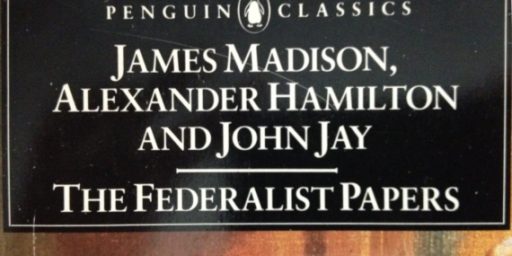
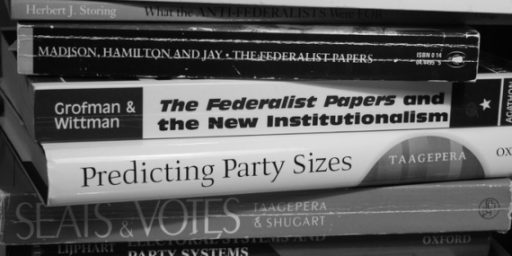
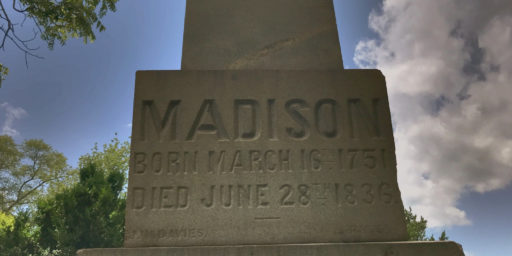
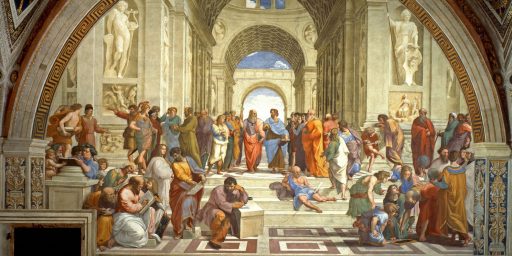
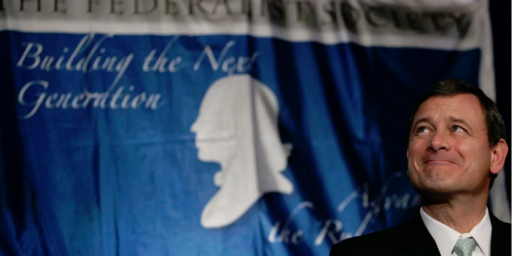
It’s been widely accepted in political science that the modern definition of the word “democracy” includes any system which functions by consent of the governed. There seem to be a lot of laymen who think they’re scoring a major point by objecting to that classification for our own country, though.
I suspect it’s another expression of the average american’s desire to see our system as exceptional. “Everyone else is a democracy, but we are a republic, which is why we’re better.
Thanks for all the references, they will make rebuttals of the “we have a republic, not a democracy” nonsense easier in the future.
On the semantic argument, you absolutely have the right of it. However, there is an underlying point that they’re trying to make (and it’s not Ben Wolf’s). I wish that there were a distinction between democracy (in ideal) and republicanism (a representative form of government). It would make the discussion easier.
In any event, when I hear the phrase mentioned, it’s usually not in response to the government not doing what the polls say the public wants or vice-versa, but usually about the Senate, the filibuster, or the electoral college. During which, those on the other side of the table are arguing precisely that out government is undemocratic.
Which is the point they’re trying to make. Our system was not set up in order for majority rule. This is true, as you point out, of most democratic governments, but that doesn’t change the fact that it’s true of ours and not a failure of the system to work properly.
It’s fair and right to say that we live in a democracy as a form of government, but it becomes more problematic to then use the term (as in ideal) to them argue that we should change our system to become more of a democracy. But the lights of the first part, we’re already there, senate and all!
Steven, You mean there are other understandings of the terms? I have just got to get out of this cave I live in and spend more time watching Fox TV and listening to conservative radio….
Ahhh…. no I don’t.
Where I will draw an opposing point to your observation is that there are many in the current American political spectrum (including some who would normally claim this to be a “republic”) that various elements of American life and law should “be left to a vote of the people”–as in referendum. The argument made in these cases is “after all, we are a democracy.” The principal justification for such referenda is usually the “people” are “wiser” than their leaders–freely translated, “I will not be able to accomplish what I wish through normal legislative means.”
Not picking at nits TW, but the fillibuster is entirely a creature of the rules of the Senate. Just wanting to clarify for those who may not know.
Ozark, absolutely correct. Indeed, the current manifestation of the filibuster (used often and compaaratively freely) is a relatively recent development. I mentioned it mostly because it’s a discussion where the phrase comes up.
John F. McManus:
Now why would they misquote it, I wonder, but to push the agenda for a direct democracy?
But, a Republic it is, like it or no. Franklin you see, understood that Democracy is two wolves and a sheep voting on lunch. That in fact as soon as the voters figured out they could vote themselves money from the treasury, all was lost. Indeed, this fell into areas of basic rights as well;
…
Since we seem prone in this thread to gather quotes….
• Virginia’s Edmund Randolph participated in the 1787 convention. Demonstrating a clear grasp of democracy’s inherent dangers, he reminded his colleagues during the early weeks of the Constitutional Convention that the purpose for which they had gathered was “to provide a cure for the evils under which the United States labored; that in tracing these evils to their origin every man had found it in the turbulence and trials of democracy….”
• John Adams, a signer of the Declaration of Independence, championed the new Constitution in his state precisely because it would not create a democracy. “Democracy never lasts long,” he noted. “It soon wastes, exhausts and murders itself.” He insisted, “There was never a democracy that ‘did not commit suicide.'”
• New York’s Alexander Hamilton, in a June 21, 1788 speech urging ratification of the Constitution in his state, thundered: “It has been observed that a pure democracy if it were practicable would be the most perfect government. Experience has proved that no position is more false than this. The ancient democracies in which the people themselves deliberated never possessed one good feature of government. Their very character was tyranny; their figure deformity.” Earlier, at the Constitutional Convention, Hamilton stated: “We are a Republican Government. Real liberty is never found in despotism or in the extremes of Democracy.”
• James Madison, who is rightly known as the “Father of the Constitution,” wrote in The Federalist, No. 10: “… democracies have ever been spectacles of turbulence and contention; have ever been found incompatible with personal security, or the rights of property; and have in general been as short in their lives as they are violent in their deaths.” The Federalist Papers, recall, were written during the time of the ratification debate to encourage the citizens of New York to support the new Constitution.
• George Washington, who had presided over the Constitutional Convention and later accepted the honor of being chosen as the first President of the United States under its new Constitution, indicated during his inaugural address on April 30, 1789, that he would dedicate himself to “the preservation … of the republican model of government.”
• Fisher Ames served in the U.S. Congress during the eight years of George Washington’s presidency. A prominent member of the Massachusetts convention that ratified the Constitution for that state, he termed democracy “a government by the passions of the multitude, or, no less correctly, according to the vices and ambitions of their leaders.” On another occasion, he labeled democracy’s majority rule one of “the intermediate stages towards … tyranny.” He later opined: “Democracy, in its best state, is but the politics of Bedlam; while kept chained, its thoughts are frantic, but when it breaks loose, it kills the keeper, fires the building, and perishes.” And in an essay entitled The Mire of Democracy, he wrote that the framers of the Constitution “intended our government should be a republic, which differs more widely from a democracy than a democracy from a despotism.”
In light of the Founders’ view on the subject of republics and democracies, it is not surprising that the Constitution does not contain the word “democracy,” but does mandate: “The United States shall guarantee to every State in this Union a republican form of government.”
Probably the closest you’ll see to direct democracy would be in Switzerland, a country of more than 7 million people. Since the ratification of the Constitution of 1848 nearly all legislation of any significance has been put up for referendum. In addition, once passed any law can be challenged and repealed by the citizenry relatively easily. Proposing laws to be passed by initiative is relatively easy as well.
The Swiss system is sometimes referred to as “half-direct democracy”.
BTW, my many times great-grandfather is credited with formulating the original Swiss Articles of Confederation more than 700 years ago.
@Eric: But all you are doing is quoting two+ century old usages of the terms without dealing with what the terms meant then and now and why. As such, you are rather missing my point.
BTW, the main point of guaranteeing a “republic form of government” was to guarantee a representative system, rather than reversion to monarchy/aristocracy of some sort. This really isn’t an argument against my position.
@Dave: Good point, as Switzerland does have some specific elements to its system incorporate direct democracy. Still, I would argue is it primarily a representative system since basic governance is handled by elected representatives. Interesting/cool about the ancestors.
@Trumwill:
There is a whole other set of discussion to have in the context of the basic concepts, of issues like the electoral college, representation in the Senate, the filibuster, etc.
I think Eric gets your point.
He just don’t want to give up his pedantic asshole shtick.
A couple more points I could have/should have touched on before: The Senate is, arguably, the least democratic AND the least republican branch of our gov’t. Least democratic in that they (constitutionally) have the fillibuster. Least republican in that all states get 2 representatives in the Senate regardless of population (One man, one vote??? Not here!!!)
Interesting Dave. How do they avoid the complete disfunction that is California?
(A serious question. From what I have seen of CA politics, the Legislators have been castrated. How did the Swiss dodge that bullet?)
@Ozark:
While the initiative does create difficulties in CA, the main institutional problem has been the 3/5th requirement to pass budgets and pass tax increases. This empowers the minority and require deal-making (which costs money).
In effect Switzerland’s is a consensus system and the Swiss have a very strong sense of national identity, consciousness, and solidarity (despite the four languages spoken in the country).
NBC news just opened its show with film of Israeli soldiers gunning down unarmed protesters.
Curiously, the entire blogosphere seems to be ducking this story.
I have been hearing ‘we’re a republic, not a democracy’ since I was a kid in the early ’60s. It was a big deal with the Birch Society. For 50 years I’ve never heard an explanation that wasn’t a non-sequitur.It seems to revolve around a desire to exclude the lower socio-economic orders (i.e. people not like me) from influence, coupled with an unwillingness to say so.
The conversation is missing some important points when we don’t consider how much more democratic our politics are now than they were when Madison was writing the Federalist papers.
Dr. Taylor,
I would in fact argue that we are a democracy and NOT a republic as Madison understood it. If one looks at the 18th Century idea of Republicanism (especially Kantian Republicanism) one will see that these thinkers were not at all in favor of a liberal democratic form of governance where citizens get to vote. The who idea of Kantian Republicanism is that many, many people are excluded from governance. Republicanism of the 18th century is notable for the idea that it is built on the idea of EXCLUSION while liberal democracy is ostensibly built on inclusion.
The makeup of the US government in the early days was more akin to this form of republicanism, insofar as almost everyone was excluded from voting – today we are much more democratic. In fact, it is notable that most advocates of Republicanism were appalled at the idea of all citizens being involved in selecting a government. One can read Kant to get this idea very easily – only a very small strata of men were to be involved in decisionmaking, and even then there is no mention of conventional elections. To say that we are a Republic in the way that the people of that time understood it is absurd.
(BTW, I think this also puts the lie to those who attempt to use Kant to argue for the democratic peace).
What I’m suggesting is that words mean things. Those meanings have not changed.
@Eric:
Except, of course, the meanings of words can typically only be discerned by understanding the context in which they are used.
Moreoever, the exact meaning of words do change over time.
And, for the trifecta: you are misusing some of the terms. To say “Democracy is two wolves and a sheep voting on lunch” is both glib and incorrect. And that is just a simple example.
@Brett:
I take the point, although Kant, per se, isn’t directly relevant to what I am talking about.
I would argue, and this is simple response to a complex discussion (and one made prior to my coffee!) that Madisonian republicanism laid the foundation for the current democracy we have, both practically (in terms of the political engineering of the Constitution) and philosophically speaking in terms of the underlying ideas.
I guess my point was that if we look at what contemporaries of Madison meant by “Republic,” it differs quite considerably from what we have today. It is a conception of representation that did not even necessarily involve elections, let alone free and fair ones.
In the years prior to the Constitution the country was a ferment of ideas and governing philosophies that ended generally in a compromise based upon the principles outlined in the Constitution.
But then came reality. When it was no longer an exercise in theory but a practical reality the ruling elites, who were once united, divided up along the lines of those in favor of more central government power, the Federalist, and those opposed to more central government power, the Republicans.
What is interesting is that regardless of which side of this ideological divide the elites fell, when it came to their turn in power they all expanded the understanding of the role of the Federal government through exercising the powers of the office of the Presidency. Not a single one of them would be called a strict constructionist, as that term is used today.
In the education that the Founders were taught history, ‘Democracy’ meant Athens. ‘Republic’ meant Rome. To them the difference was clear. If it is not clear to the readers here what that difference was — and what it meant to the Founders — they should get off the keyboard and study it.